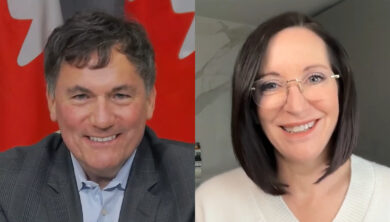
Navigating the New World Disorder
Canada’s Post-Pandemic Foreign Policy, by Roland ParisThe worst pandemic in a century. The sharpest economic slowdown since the Great Depression. A polarized United States that distrusts its own allies. Europe’s future in question. Free trade waning. Barriers to the movement of people, goods and ideas growing. Authoritarianism on the march. China emboldened. Geopolitical tensions rising. Even talk of a new cold war.
This snapshot of world affairs in July 2020 should be a wake-up call for Canadians. Our country has long benefited from a relatively benign international setting, with few direct threats to our security, privileged access to the world’s largest and richest market, and international rules and institutions that sustained a relatively open and stable world order. We can no longer take those conditions for granted.
Canadian policy-makers are understandably preoccupied with managing the current public health and economic emergency, but the COVID-19 pandemic is also accelerating geopolitical shifts that preceded the crisis and will continue beyond it. Leaders in government, business and other sectors must not delay in grappling with the implications of these changes.
This paper highlights three shifts of particular importance to Canada:
- the transforming politics and policies of the United States;
- the rapid rise of China-U.S. rivalry; and
- the disintegrating liberal world order.
Each, on its own, would necessitate a rethinking of Canadian strategy. In combination, they represent the most serious foreign-policy challenge facing Canada since the Second World War. The future prosperity, security, and well-being of Canadians will depend, in no small measure, on how well we navigate this unfamiliar world.
Managing relations with the United States is Canada’s paramount foreign-policy interest for obvious reasons: Canada’s physical security requires U.S. cooperation in defending North America; its sovereignty relies on the U.S. respecting Canadian jurisdiction and autonomy; and its economy has been built around ready access to the U.S. market – the destination for three-quarters of Canada’s merchandise exports, accounting for approximately one-fifth of its GDP and supporting an estimated 1.9 million Canadian jobs.
Donald Trump’s presidency has jeopardized these Canadian interests. He arrived in office promising to “tear up” the North American Free Trade Agreement (NAFTA), imposed tariffs on imports of Canadian steel and aluminum on “national security” grounds, then threatened to punish “the people of Canada” in retaliation for comments made by Prime Minister Justin Trudeau at a G7 meeting in 2018. Although the NAFTA was ultimately renegotiated and metals tariffs were lifted, Trump’s threats have shaken Canada’s confidence in our closest ally. When Canadians were asked in a 2019 survey to describe the United States in a single word, their most frequent answers were: Trump, president, chaos, confused, and bully. Recent reports that the U.S. might re-impose tariffs on Canadian aluminum simply reinforce these suspicions.
The period leading up to this November’s presidential election promises to be tumultuous, with Trump lashing out at his critics — real and imagined — in the U.S. and abroad. If he ultimately loses the election, he and his supporters may reject the results as fraudulent; he has already begun questioning the reliability of mail-in voting, which many states plan to offer because of the coronavirus pandemic. A constitutional crisis following the election is possible. If, on the other hand, Trump wins re-election after surviving not just a politically damaging pandemic and economic crisis but also impeachment, he may feel genuinely unleashed during his second term.
Most Canadians would welcome a Joe Biden victory in the November election. He has promised to restore America’s “historic partnerships” with its “democratic friends” — a sharp contrast to Trump, who has shown little regard for traditional U.S. allies, including Canada. Moreover, many of Biden’s policy promises, such as rejoining the Paris climate accord, upholding international human rights and recommitting to nuclear arms control, are consistent with Canadian public opinion and government positions.
Nevertheless, no one should expect a return to “normality” in Canada-U.S. relations, even if Biden wins. The Trump presidency has been a symptom of deeper forces in U.S. politics that will not disappear when he leaves office. Nativist, anti-internationalist, America First chauvinism could remain a powerful force in U.S. politics for some time, just as Jacksonian populism outlasted the presidential term of its 19th-century namesake, Andrew Jackson. Trump has normalized these ideas in the minds of many U.S. voters and refashioned the Republican Party as their champion. It is now difficult, for example, to find leading figures in either the Republican or Democratic parties who publicly defend the idea of free trade. The recent closing of U.S. borders to travellers was a public health decision, but it, too, has been cheered by nativists and anti-globalists. Further, the pandemic may worsen income gaps and increase resentment among those whose living standards did not rise during recent decades of economic growth.
One of Canada’s immediate concerns has been to keep the Canada-U.S. border open for business. Canadian-based firms participating in North American supply chains depend on reliable access to the U.S. More than half of the roughly $2 billion in daily trade that crosses the border does so in trucks. In late March, after the pandemic struck, the federal government negotiated an agreement with the U.S. to close our shared border to non-essential travellers while keeping it open to commerce. This agreement alleviated fears that Trump might precipitously shut the border completely, while also reducing Canadians’ exposure to travellers from the United States, where COVID-19 infection rates have generally been higher than in Canada. Trump’s threat in April to prohibit shipments of medical masks to Canada by 3M, a Minnesota-based company, also prompted urgent outreach by Canadian officials to their American counterparts and contacts. A few days later, 3M announced the shipments would proceed.
The 3M incident highlights a longer-term challenge for Canada as we deal with a changed United States. Given the likelihood of continued volatility in American foreign policy, Canada must develop more sophisticated machinery to advocate our interests at all levels of the U.S. political system — federal, state and local — and in the U.S. private sector and media. Shortly after Trump’s election in 2016, the federal government made contact with influential figures in his circle and later mobilized provinces, cities and businesspeople in a wide-ranging effort to defend Canadian interests by communicating with influential Americans, both inside and outside the U.S. government. Much of this campaign focused on the NAFTA renegotiation and it has since been reactivated in moments of urgency, such as the 3M incident. However, it remains largely reactive and ad hoc — fighting political fires only when smoke becomes visible. Canada now needs to invest more in “fire prevention” by identifying and addressing problems and threats to Canadian interests before they materialize. This could include:
- institutionalizing co-ordination mechanisms among Canadian advocates;
- significantly expanding Canada’s diplomatic representation and networks in different parts of the United States;
- strengthening the federal government’s in-house capacity to track key issues and influencers in the U.S. in real time; and
- fostering think-tank programming in Washington that aligns with Canadian interests.
Canada must also prepare for the possibility the U.S. will continue to retreat from global free trade in coming years. In a world of rising protectionism, Canada’s efforts to secure exemptions from new U.S. trade restrictions will become more urgent. These efforts will require convincing decision-makers in Washington that Canada and the U.S. comprise a common economic space. If the White House proposes reshoring overseas production and supply chains to the U.S., for example, the federal government must make the case that nearshoring these operations to Canada would effectively serve the same goal. The breakdown of the global economy into rival blocs would be unfortunate for Canadians, imperilling the gains of globalization, but we must hedge against such a future. Failing to secure a foothold in one of these blocs would be disastrous.
Another shift in Canada’s international environment, which may become the defining geopolitical development of the 21st century, is China’s rise to great-power status and the reaction of the United States. Scholars of international relations refer to power transitions in world politics, when rising powers challenge the dominance of “incumbent hegemons.” The historical record suggests these are periods of elevated risk for war. Although there is no imminent threat of military conflict between the U.S. and China, tensions are rising and will likely continue to rise, whether or not Donald Trump is re-elected. Attitudes within the U.S. government and among the leaders of both major political parties have quickly shifted towards viewing China as a strategic challenger, if not an adversary. The U.S.’s decades-old strategy of engaging China in the hope that it might liberalize at home and become a “responsible stakeholder” in international affairs is all but dead. Rising trans-Pacific tensions seem inevitable.
Canada has its own reasons to view China warily. Two Canadian citizens, Michael Kovrig and Michael Spavor, have languished in Chinese detention since December 2018. They were detained shortly after Canada arrested Meng Wanzhou, the chief financial officer of the Chinese telecommunications giant Huawei, on an extradition request from the U.S. In June 2020, more than 500 days after they were imprisoned, Chinese officials formally charged the two Michaels with “gathering state secrets and intelligence for foreign countries.” By all appearances, they are innocent victims of a Chinese effort to pressure Canada to release Meng. Beijing has also restricted certain Canadian agricultural exports to China, likely for the same reason. These actions are consistent with coercive measures China has used against other countries; in May, for example, Beijing slapped 80-percent tariffs on Australian barley exports to China after Canberra called for an independent, international inquiry into the handling of the coronavirus outbreak in Wuhan.
The challenges facing Canadian policy-makers go well beyond the current detainee crisis. Over the longer term, they will need to reconcile competing imperatives on Canadian policy towards China and Asia. First will be the need to protect Canada from China’s harmful practices, which also include attempts to gain control of strategically sensitive resources, infrastructure and technologies; various forms of political interference in domestic affairs; and suspected infiltration of communications networks. Increasing repression of political dissidents and minority groups within China is also worrisome.
Canada must face these challenges squarely. Securing and diversifying supply chains for medical equipment and pharmaceutical ingredients — a vulnerability exposed by the COVID-19 pandemic — is just a start. We will require a stronger system for vetting prospective investments in Canada by state-directed foreign companies. We must also safeguard the Canadian telecommunications infrastructure, including 5G, and hold onto Canadian advantages in certain emerging technologies such as artificial intelligence. Finally, the federal government will need to be consistent and firm in calling out China’s human rights abuses.
The second imperative will be to expand Canadian trade, including in Asia, which already accounted for more than two-thirds of global economic growth before the pandemic and appears to be the first region to be emerging from the crisis. Although the U.S. will remain Canada’s indispensable export market, doubts about the trade-friendliness of future U.S. administrations, along with the potential gains from trade expansion in the fast-growing markets of Asia and elsewhere, reinforce the logic of diversifying Canada’s trade markets. China is already Canada’s third-largest trading partner — a commercial relationship that should be sustained even as Canada pushes back against China’s problematic behaviours. Co-operation with Beijing on transnational problems, including climate change and global public health, will also be important.
Beyond China, Canada will need a regional strategy that identifies priority partners such as Japan, South Korea, Singapore, Indonesia and Vietnam and devotes sustained attention to strengthening those relationships in close partnership with the Canadian business community. To date, Canadian exporters have not taken full advantage of existing trade agreements, including the Comprehensive and Progressive Agreement for Trans-Pacific Partnership, the Canada-European Union (EU) Comprehensive Economic and Trade Agreement, and the Canada-Korea Free Trade Agreement. This must change.
Third, we must triangulate our approach to Asia with our U.S. relationship. This will become trickier as China-U.S. tensions mount — as noted, Canada is already in the middle of a dispute between these two great powers over the arrest of Meng Wanzhou. By virtue of our history, geographical location, economic imperatives, security requirements, values and societal connections, the United States will remain Canada’s closest ally and trading partner, regardless of whether U.S. leaders reciprocate the sentiment. Still, Canada has little to gain by unnecessarily provoking China, particularly if there is any doubt about the U.S.’s willingness to defend its northern ally against Chinese retaliation. Canada, alone, cannot out-muscle China in a bilateral dispute.
Finally, Canada should work with other countries, including our traditional partners in Europe, to develop joint approaches to China that combine resolve and restraint. The outlines of such a grouping may be emerging: The EU has recently hardened its position on China, as has the United Kingdom. For their part, Japan and Australia had prior experiences with Chinese methods and were among the first to recognize the challenge. China’s neighbours, too, are concerned, although they generally wish to avoid an escalating confrontation with Beijing. Clearer limits on Chinese behaviour and closer co-ordination among like-minded countries to uphold these limits are essential to curb Beijing’s adventurism, but treating China as if it is an enemy could actually turn it into one. There is too much at stake — for the stability of the global economy, for the health of billions of people facing a pandemic and a creeping climate crisis, and ultimately for international peace — to abandon prudence. An unnecessary new cold war would be bad enough. A real war, although less likely, would be a tragedy.
The liberal international order — the institutions, alliances, rules and norms that the United States and its partners first constructed after the Second World War — faced few challengers after the Cold War, when the Soviet Union and its ideology collapsed and American power was supreme. Today, this order is foundering. Although many of its structures remain intact, including the United Nations and its associated agencies, the political commitment to sustain them is weakening. Three of the world’s biggest powers — the U.S., China and Russia — are now effectively revisionist states that see the existing international system as harmful to their interests. None wishes to destroy the order outright, but all three want to change it — yet they hold conflicting notions of what changes are needed. The only remaining status quo power in the world is the EU, which broadly seeks to uphold the existing system of international institutions and rules but has yet to translate its enormous economic weight into geopolitical influence.
Although Trump bears responsibility for turning against U.S. allies and international institutions, the liberal order was eroding long before he entered the White House. The American public’s mounting fatigue with the high costs, in dollars and lives, of U.S. military operations in the post-Cold War period was already visible in the 1990s. When George W. Bush campaigned for president in 2000, he promised to reduce U.S. involvement in “nation building” — a reaction to costly American operations in the Balkans and Somalia in the preceding decade. Paradoxically, it was Bush’s own interventions in Iraq and Afghanistan after 9/11 that became focal points of public disaffection in the United States and elsewhere. Meanwhile, the U.S.’s unipolar moment was waning and the diffusion of global power emboldened a revanchist Russia and an ambitious China, each resentful of the United States’ pre-eminence and determined to roll back the spread of liberal ideas that threatened their own regimes. Among other things, they created “counter-order” international institutions advocating illiberal principles, including the Shanghai Cooperation Organisation and the Eurasian Economic Union. Elsewhere, transnational networks of illiberal populists within the democratic world took aim at both globalization and liberal governance, blaming both for the corruption of their societies.
It is not the decay of the liberal international order that has been surprising, but its breathtaking speed. The World Trade Organization (WTO) no longer has a functioning appeals mechanism to adjudicate trade disputes. The World Health Organization has been caught in a geopolitical firestorm during a pandemic that has already killed nearly half a million people. It is uncertain if G7 leaders will succeed in meeting later this year. It took months for the UN Security Council simply to agree on a symbolic call for a global ceasefire during the pandemic. Two decades ago, the G20 co-ordinated a vigorous response from major economies to limit the damage of the global financial crisis, but as Thomas Bernes of the Centre for International Governance Innovation writes, the group’s response to the current emergency has been “totally inadequate to the challenge.” The North Atlantic Treaty Organization, thankfully, continues its military operations in Europe despite the surrounding political fracas, but some wonder if the alliance could survive another four years of President Trump. The transatlantic community has suffered one body blow after another. A change of U.S. president would help, but again, these problems reflect deeper trends.
All of these developments are especially confounding for Canada, whose foreign policy since the Second World War has emphasized effective multilateralism. It made good strategic sense: international institutions and rules have helped sustain a relatively stable and open international system, whereas in a dog-eat-dog world of unrestrained great-power politics, smaller countries such as Canada fare poorly — especially if they live next door to one of the biggest “dogs.” Within North America, institutions and rules have helped assure Canada’s sovereignty, protecting it from Finlandization. In the broader world, they have amplified Canada’s voice in international affairs and provided opportunities to exercise modest but real influence. Multilateralism has also reflected cultural values that many Canadians embrace at home, including the aspiration to manage the political differences of a diverse population through peaceful institutions and law.
However, many of the international institutions that Canada has supported are products of a particular configuration of international power and ideas: Pax Americana. With that system now fragmenting, we need to rethink our approach to multilateralism in a less rule-bound and nastier world. In this new world, Canada will need friends and partners to provide the safety of numbers. Establishing closer working relationships with like-minded democratic states should be a top priority. Liberal democracy and its associated freedoms of speech and conscience — and the rule of law — are under assault around the globe. China, Russia and other emboldened authoritarian regimes such as Saudi Arabia are targeting individual democracies for punishment or reward, seeking to demonstrate their strength and alienate democratic nations from each other. To paraphrase Benjamin Franklin, if the world’s remaining liberal democracies do not hang together, they will hang separately.
To retreat into a democratic redoubt, however, would be a mistake. Most big challenges facing the world — from climate change to global public health — require co-operation among states regardless of their political ideology. Yet many multilateral institutions are failing to facilitate this co-operation. Some of them, including nuclear arms control arrangements or the international refugee regime, are foundering, while others, like the United Nations Security Council, have become largely paralyzed. And there still are no effective multilateral arrangements in a number of important emerging areas such as the use of cyber-weapons. We must decide where we will focus our efforts, and in these priority areas we must devote a sustained effort to working with partners to make existing structures work and, if necessary, craft new ones. Paradoxically, the pandemic crisis may facilitate such activism because it has exposed both the weakness of existing multilateral arrangements and the necessity of co-operation.
Although the world is changing around us, Canadians should not see themselves as passive objects of geopolitical change. By working with others, we can shape our future. After all, Canada remains a rich, generally well-regarded country with extensive international connections and a diplomatic service that is skilled at multilateral diplomacy. These assets have enabled us to assemble international coalitions to tackle specific global problems when existing multilateral mechanisms have fallen short. A recent example is the Ottawa Group on WTO reform. Formed in 2018 to find ways of salvaging the failing institution, the group’s discussions have already shaped the establishment of an appellate body for trade disputes, effectively a replica of the WTO’s now-moribund appeals mechanism. This type of pragmatic, issue-specific, innovative multilateralism — which may also include private actors, non-governmental organizations and subnational governments, depending on the issue — will be needed more in the coming years, particularly if existing institutions become hobbled by greater geopolitical contestation.
Nevertheless, we must also be clear-eyed about the limits of Canada’s influence in an increasingly chaotic world. To be effective, our multilateral efforts will need to focus on a smaller number of issues, problems and institutions — concentrating with those most directly affecting the prosperity, security, and well-being of Canadians — and then stay the course. The same is true if Canada seeks leadership positions in multilateral organizations: our actions will speak louder than our words. Every country seeking a seat on the Security Council, for example, claims to be a model international citizen, but if our contributions to UN peace operations are minimalist and our development assistance modest, we are likely fooling no one but ourselves.
Canadians and their leaders have long treated the country’s foreign policy as a secondary concern — almost as an optional luxury. Apart from relations with the U.S., which have required constant tending, did it really matter what Canada did elsewhere? This complacency has been possible because we enjoyed a relatively benign international environment. One of the unfortunate consequences of this has been the devaluing of international affairs expertise in Canada. Outside of a few government departments in Ottawa, of Canadian companies with overseas operations, and of a smattering of experts in various fields, the international-affairs literacy of our political leaders, business class, journalists, and populace has remained limited, even as our population has become more diverse. Multiculturalism — a magnificent feature of Canadian society — is not the same as worldliness. Even our university students have been less likely to go abroad for part of their degrees than students in Europe, the United States and Australia.
Responding effectively to the challenges of a changed world will require, in the short term, marshalling the expertise that does exist. Federal public servants, able as they are, should not be expected to rethink Canada’s foreign-policy strategy alone. The problems we face touch on interconnected domains — business, security, immigration, health and innovation, to name a few — that transcend traditional distinctions between foreign and domestic issues and between government policy and private action. Responding to the three geopolitical shifts outlined in this paper will necessitate not only new policy approaches, but also different ways of doing foreign policy. As noted, the federal government managed the renegotiation of NAFTA in 2017-18 by mobilizing a whole-of-Canada approach that included provincial and municipal governments, business and union leaders, and various individuals with connections in the U.S. This model may be difficult to replicate, but it is emblematic of the type of cross-sectoral effort needed on other pressing issues. We must also reinvest in the core governmental instruments of our foreign policy, including Canada’s diplomatic service and overseas missions as well as our military preparedness — an insurance policy against a riskier future. The same is true for Canadian development assistance and its role in promoting stability and sustainability abroad. Canada could not isolate itself from the harmful effects of an unstable, unsustainable world, even if it wanted to.
Deepening Canada’s global competencies is a longer-term imperative. Our private sector needs the knowledge and networks to pursue opportunities (and take chances) in foreign markets other than the United States. The federal public service needs more expertise on Asia, in particular. It should also recruit more mid-career professionals from different occupations and strongly encourage serving officials to seek experiences outside government as part of their professional development. These steps would bring fresh ideas into the government and strengthen its connections to other sectors of Canadian society. When the COVID-19 crisis passes, Canadian governments, universities and colleges should implement plans to send thousands more Canadian post-secondary students to learn abroad every year so they can bring their new knowledge back home. There is also a need to broaden citizen engagement in foreign-policy discussions to solicit their ideas, mobilize individuals and groups that can contribute directly to advancing Canada’s goals, and build the international-affairs literacy of a larger group of Canadians. Political leaders, for their part, respond to electoral incentives, and as Canadians come to recognize the impact of international affairs on their lives, voters may insist that candidates for national office demonstrate a genuine understanding of the external challenges facing the country and what to do about them. All these initiatives will take time to bear fruit, but they are necessary investments in the basic tools Canada will need to succeed in a more competitive and tumultuous world.
The coronavirus pandemic and the economic shock it has caused will eventually pass. We all look forward to the day when a vaccine is available, when markets have settled, and when unemployment has declined. But the pandemic crisis has also accelerated geopolitical shifts that show no sign of dissipating — and some of them jeopardize Canadian interests in ways that may be unfamiliar to a country long used to a more benign international environment. The three challenges highlighted in this paper — managing relations with a changed United States, adjusting to a world of mounting Sino-American rivalry, and sustaining multilateral co-operation in areas of importance to Canada — are not the only ones this country will face. Canada’s Arctic sovereignty, for example, must be assured as the sea ice disappears due to climate change; open societies such as Canada are exposed to various types of digital disruption and attempts to destabilize our democratic politics; and competition is growing among states seeking to dominate emerging technology sectors, from artificial intelligence to bio-technology. The first step in responding to these challenges is to acknowledge them. We must face the world as it is, not as we might imagine or wish it to be. Canada will need to awaken from its long, comfortable slumber.
While the pandemic has highlighted worrisome trends, it has also revealed important Canadian strengths. Unlike societies that have been driven apart by the pressures of an unprecedented public health and economic emergency, Canadians largely came together. This unity might not last, but the fact that Canadians and their political leaders responded collaboratively in a moment of acute strain points to a deeper resilience in Canadian society. The same has been true of our international response. Canadians understand that viruses do not carry passports and international co-operation will be essential to address problems that transcend borders. Instead of recoiling from the world when COVID-19 struck, Canada began working with other countries on a global response to the pandemic — to keep vital supplies and medicines moving, to prevent the collapse of health-care systems elsewhere, and to support joint efforts at vaccine development. We will need to call upon all these strengths in the coming years, as Canada navigates the new world disorder.
Partners
Private Sector Partners: Manulife & Shopify
Consulting Partner: Deloitte
Federal Government Partner: Government of Canada
Provincial Government Partners:
British Columbia, Saskatchewan, Ontario & Quebec
Research Partners: National Research Council Canada & Future Skills Centre
Foundation Partners: Metcalf Foundation
PPF would like to acknowledge that the views and opinions expressed in this article are those of the author(s) and do not necessarily reflect those of the project’s partners.









